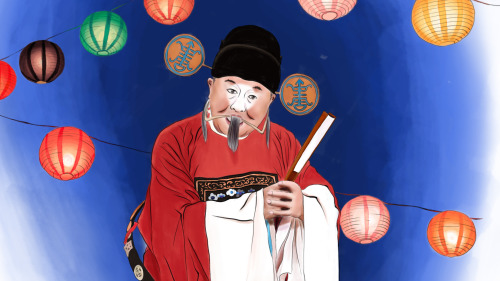
[ad_1]
Bao Gong’s anti-corruption poems are rare in the history of Chinese literature. (Image source: Public domain)
Bao GongHis surname was Bao, his given name was Zheng, and his courtesy name was Xiren (999-1062). He was a native of Hefei, Anhui Province and a famous poet in the Northern Song Dynasty.honest and upright official. He was upright and selfless throughout his life, enforced the law impartially, was not afraid of power, and eliminated harm for the people. He was a leader at that time and in later generations.common peopleFavorite character. “Bao Gong” is the honorific title everyone gives him. According to the unearthed epitaph of Bao’s family, his “outrageous voice caught the eyes and ears of the world, and even foreign barbarians respected his name. The scholar-bureaucrats in the imperial court, as well as scholars from far away, did not use his official title, but called him “Gong”. He served as the direct bachelor of Tianzhang Pavilion, the direct bachelor of Longtuge, the prefect of Kaifeng, and the deputy privy envoy, so the people called him Bao Daizhi, Bao Longtu, and Bao Qingtian.
A rare poem about abstaining from corruption and promoting integrity
When Bao Gong became a Jinshi at the age of 28, his parents were already old. He did not want to travel far to be an official, and preferred to serve his parents at home. It was not until his parents passed away that he went to Tianchang County, Yangzhou and became a county magistrate. After completing his term, he was promoted to the magistrate of Duanzhou (now Zhaoqing, Guangdong). After serving in Duanzhou for about three years, he did a lot of practical things. For example, controlling floods in the Xijiang River, digging wells, storing grain, running schools, etc. Especially in rectifying prison litigation, he made great efforts. After his rectification, there was no backlog of cases in the yamen, and there were no prisoners complaining about injustice in the prison. It can be said that the evil has been eliminated, and the people’s praises have become louder. His reputation as Bao Qingtian was laid when he took office in Duanzhou.
He is not a writer or a poet. In the “Collection of Bao Zheng” edited by his descendants, there were only 171 memorials, one family motto, and one five-character rhymed poem. Among the 171 memorials, those related to rectifying officialdom and impeaching corrupt officials ranked first, with 25 articles in total; recommending talents and discussing employment issues ranked second, with 24 articles in total. The remaining articles are suggestions on economic policy, national defense issues, and culture and education.
In “Family Instructions”, he particularly emphasized anti-corruption. The article said: “The descendants of future generations who are officials and have committed corruption shall not be allowed to return to their own family; after their death, they shall not be buried in the (family) tomb. If they do not follow my aspirations, they are not my descendants!”
As for a five-character rhyme poem, it is called the poem “Shuduanzhou County Zhaibi”. Its content is “anti-corruption and promotion of integrity”. It can not only admonish future generations, but also advise people of the time.
The poem says:
A pure mind is the root cause, and a straight path is the body’s strategy.
Good work will eventually build a building, and fine steel will not serve as a hook.
Birds and sparrows are happy when the warehouse is full, but foxes and rabbits are sad when the grass is gone.
There are lessons in the history books, and no one will be ashamed.
The poetic meaning is to advise people to be upright. Only upright people can become the pillars of the country; do not do things like rats and dogs, so as not to embarrass future generations.
Duanzhou is today’s Zhaoqing, Guangdong. The place is famous for its production of inkstones. The county governors in the past would take advantage of the opportunity to pay tribute and collect more than ten times the number of “Duan inkstones” from the local area for private use to win over the powerful. It was not until Bao Zheng was appointed as the magistrate of this place that he regulated the craftsmen to make “Duan Inkstones” for tribute, and left this five-character poem on the wall of the county governor’s mansion. According to legend, there is a place on the Duanzhou River called the “Place where Bao Gong throws inkstones”. It is said that someone else wanted to give Bao Gong an inkstone, but Bao Gong flatly refused and threw it into the river. The upright Bao Zheng would never enrich himself.

The image of Bao Gong on the stage. (Drawing: Winnie Wang/Look at China)
The reputation of The Untouchables will be passed down through the ages.
Some great poets in history have left us many magnificent poems, some of which praise the magnificent rivers and mountains of the motherland, and some of which praise people with lofty ideals, benevolent people, and heroes. However, like Bao Gong, whose main content is to abstain from corruption and promote integrity, It can be used as a motto for officials who take office. From ancient times to the present, it is difficult to find another one.
Editor in charge: Gufeng
Short URL:
All rights reserved. Reprinting in any form requires permission from this site. It is strictly prohibited to create mirror websites.
[Honorary Members Wanted]Streams can merge into the sea, and small kindnesses can achieve great love. We sincerely recruit 10,000 honorary members from Chinese people all over the world: each honorary member only needs to pay a subscription fee per year and become an honorary member of the “Look at China” website, which can help us break through censorship and blockade and provide services to at least 10,000 mainland Chinese compatriots. Provide independent and true key information to warn them in times of crisis and save them from great plagues and other social crises.






